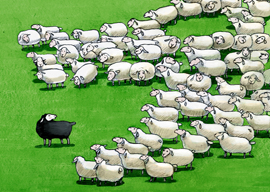
May 20, 2017

Source: Bigstock
The kind of person who succeeded in the Soviet Union was the kind of person I met who succeeded in the British bureaucracies with which I had to deal in my work. They were either without ability, in which case they resembled the talentless hacks whom Dovlatov met in the Soviet literary world: “They made up for the absence of talent by perfect loyalty to power.” Or, if they had ability and intelligence, they suppressed its exercise for the sake of a quiet and comfortable life. Describing an editor who himself had once been a man of talent, but suppressed it, Dovlatov writes, “A remarkable ability to adapt and a thirst for comfort had changed him into a model functionary.” This man was by no means a fool: “He had no illusions about what he was doing. He knew what he was doing. One saw him suffer as he took his decisions [to comply].” And Dovlatov adds: “There is no greater tragedy for a man than totally to lack character.” This is what I encountered every day, when the bureaucrats with whom I had to deal could not look me in the eye. Theirs was a kind of suffering, endured for the sake of a pension.
A passage in Dovlatov reminded me of the days when I had to deal with various bureaucracies of welfare on behalf of my patients. Dovlatov tried to find out who had vetoed the publication of his book, and why (originally it had been accepted for publication). Each time he went to the relevant office, he had to deal with someone else who knew nothing of his case:
I began to understand their strategy. Each time it was someone else. And I had to explain my case all over again. And nothing progressed.
This was precisely the method employed by the bureaucracy of the public housing department in dealing with its tenants. It denied that it had received e-mails, letters, or telephone calls (even though they had been recorded for training and monitoring purposes); the person to whom the tenant had last spoken, known only by his or her first name, was always out of the office when called again”on a training course, at lunch, on sick or maternity leave, and so forth”so that the poor supplicant had to explain for the nth time what he wanted, until he lost his temper and was categorized as aggressive and unreasonable and put on a blacklist.
As I read Dovlatov, I thought that, in the world we have made, it is not the Kingdom of God only that is within us: It is Soviet rule also.